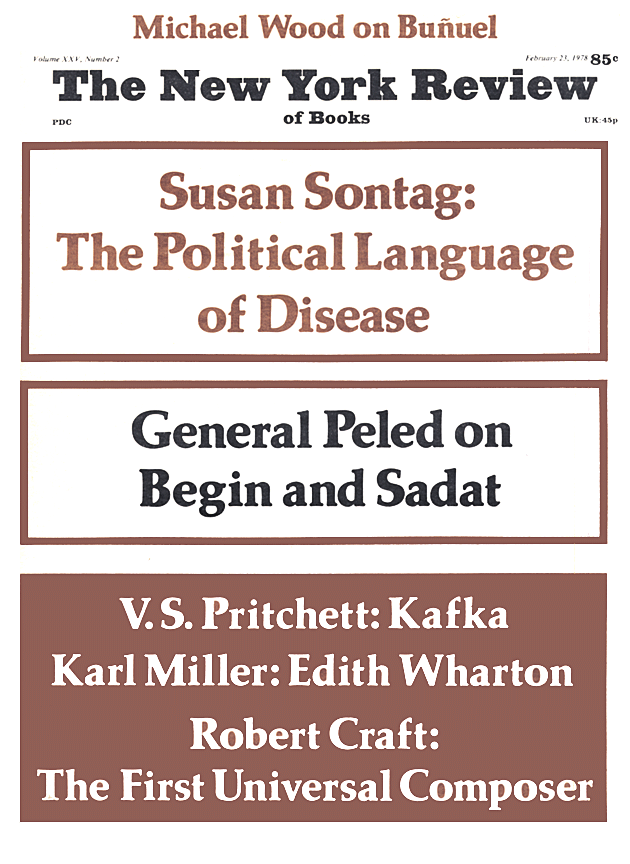In response to:
A Modern Master from the October 13, 1977 issue
To the Editors:
I appreciate the intelligent attention given to my book François Rabelais: A Study (NYR, October 13) by Gabriel Josipovici and the measured praise that mitigates his severe strictures. Some of these, however, seem to me ill-founded enough to justify a reply.
Starting his negative critique with the claim that “when it comes to what is really important about Rabelais, scholarship is not only silent; it is misleading.” Josipovici then presents my book as a good example of this. After two paragraphs of general description, he finds, in what seems to me an innocent statement of fact, damning assumptions which he attributes to me but which I know are not mine and which I believe are not embodied in my book. When I note that in Gargantua “twelve chapters (as against one plus of Pantagruel) are devoted to serious ideas…” my guilty secret is apparently out; for he goes on: “At this point we begin to see how Frame’s assumptions color his understanding For him [Frame], despite his opening disclaimer, the book is made up of separate portions of ‘light’ and of ‘serious’ material, and Rabelais is given more marks the greater the proportion of ‘serious’ to ‘light’ in any book.” (All this, I take it, because I consider some of Rabelais’s chapters serious and Gargantua a better book than Pantagruel.)
Some exaggerations lead to distortions and misstatements. “Indeed the fact that this is a story and not an encyclopedia is not noticed at all, except for the ritual-like assertion that ‘storytelling is one of Rabelais’s greatest gifts.’ ” This is a false statement, as a glance at my chapter (11) on storytelling or even at the table of contents would show. “For Frame the narrative is merely a repository of ideas” is less easy to disprove but is hardly borne out by the fact that only two or three of my seventeen chapters deal primarily with ideas. Finally, a triumphant reductio ad absurdum rests entirely on one misstatement and one false assumption: “Like other scholars, Frame is naturally puzzled why Rabelais should have chosen to write the way he did if what he wanted to do was to discourse on the glorious new dawn of the Renaissance.” (I find many things puzzling in Rabelais but not that, because I make no such assumption.)
One major point of difference between Josipovici and me lies in our sense of humanism and of how Rabelais relates to it. In his view Rabelais does so mainly, if not solely, by his wish “to mock and exorcise it.” That may well be true of humanism in the pejorative sense that Josipovici gives it; but in the more usual sense of the term for the Renaissance, that of thirst for classical learning, any such wish seems clearly outweighed in Rabelais by a strong attraction to it.
I do not contest Josipovici’s principal charge, that much recent Rabelais scholarship (perhaps including my own), being most at ease with Rabelais’s ideas, has given them more attention than perhaps they deserve. My only quarrel with his review is that in his desire to show that in the essentials Rabelais scholarship (specifically my own) is misleading, the picture he has painted of that scholarship is more misleading than scholarly.
Donald M. Frame
Columbia University
New York City, New York
Gabriel Josipovici replies:
I can only reiterate the points I made in my review: to talk of “serious” and “light” material in Rabelais appears to be a perfectly neutral procedure but in fact implies a number of large assumptions. To my mind these assumptions prohibit one from asking the really interesting questions of Rabelais. Gargantua may be a better book than Pantagruel, but not, I submit, because it contains more “serious” material than the latter. Similarly, to devote one chapter to “storytelling,” another to “Humanism,” a third to “comedy,” and so on, actually hinders one from understanding the central role of “storytelling” in Rabelais by hiving it off from all the other elements. “Central” though is still too spatial a metaphor for my liking, and one reason for the length of my introductory remarks in the review was that it is fatally easy for our language to betray us into setting up false categories in discussing a writer like Rabelais. Finally, about Humanism, I would have thought that my use of the word “exorcise” suggested that Rabelais was indeed strongly attracted, and that the only way he could free himself from its trammels was by writing as he did.
There is no way I could prove my assertions; all I could hope to do was to persuade. Clearly I failed to persuade Professor Frame.
This Issue
February 23, 1978


